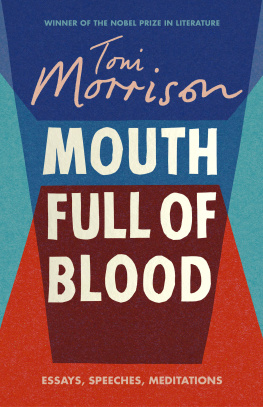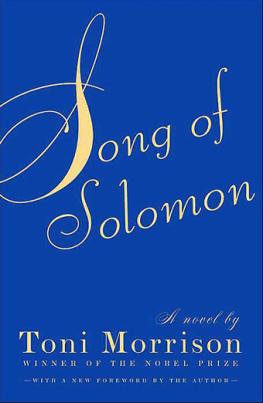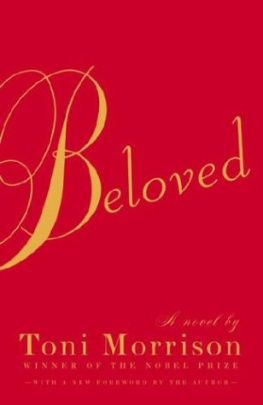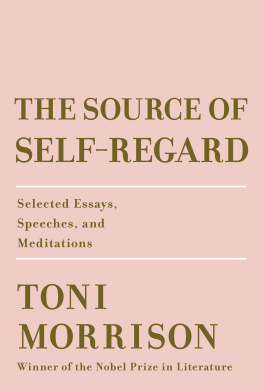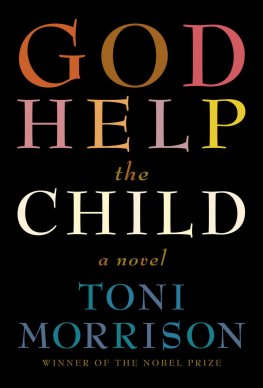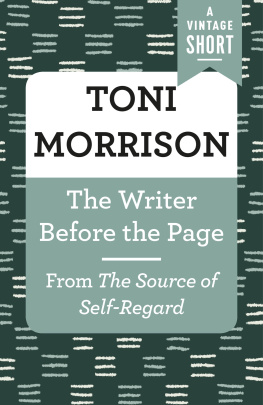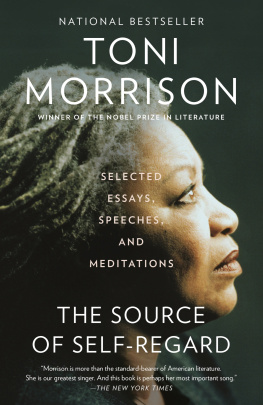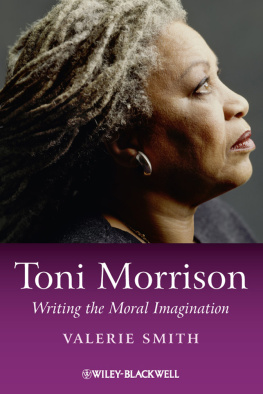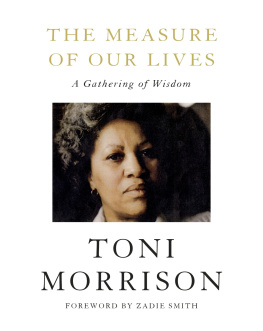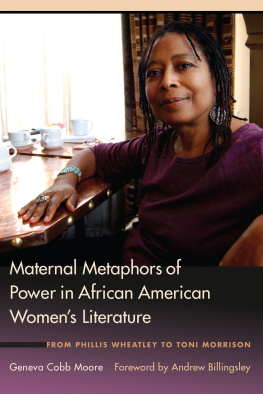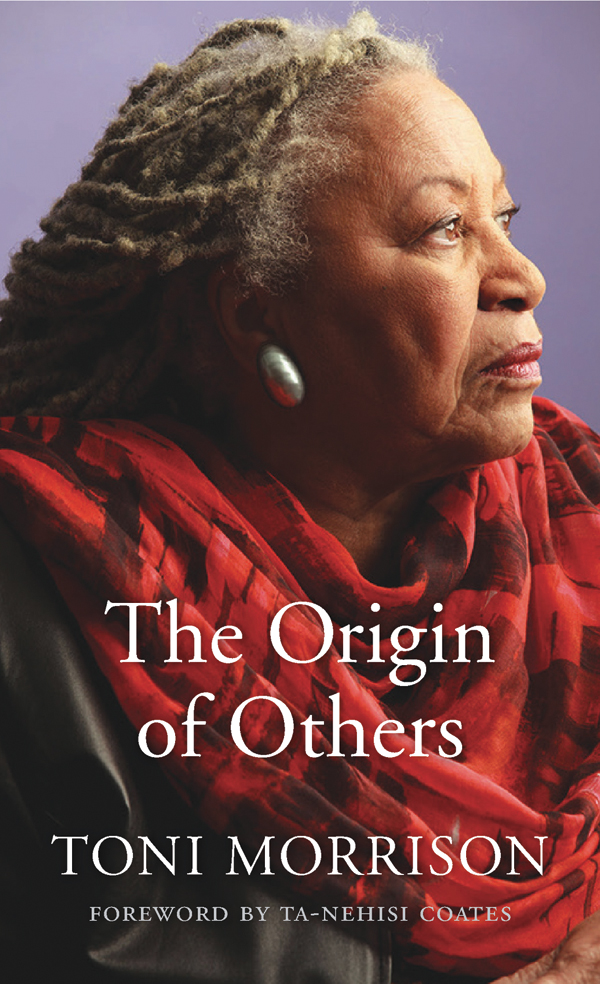I N THE spring of 2016 Toni Morrison delivered a series of talks at Harvard University on the literature of belonging. It is no surprise, given the nature of Morrisons remarkable catalogue, that she turned her eye to the subject of race. Morrisons lectures came at an auspicious time. Barack Obama was then entering the last year of his two-term presidency. His approval ratings were rising. The insurgent Black Lives Matter movement had pushed police brutality to the front of the national conversation, and unlike most conversations on race, this one netted results. Obamas two black attorneys general, Eric Holder and Loretta Lynch, had launched investigations into police departments across the country. Reports emerged out of Ferguson, Chicago, and Baltimore substantiating the kind of systemic racism that had long been confined mainly to anecdote. This aggressive approach was expected to continue under the countrys first woman president, Hillary Clinton, who was, at the time Morrison began her series, heavily favored against a man the world considered a political lightweight. All of this testified to a country intent on defying the precepts of history and at last approaching the justice end of the moral universes long arc.
And then the arc got longer.
The first reaction to Donald Trumps victory was to minimize what it said about American racism. A cottage industry sprang up asserting that the 2016 election was a populist uprising against Wall Street fomented by those left out of the new economy. Clinton was said to have been doomed by a focus on identity politics. These arguments often carried the seeds of their own undoing. No one ever explained how it was that those most often left behind by this new economyblack and brown workersnever found their way into the Trump coalition. Moreover, some of the very critics of Clintons identity politics had no problem deploying those politics themselves. Senator Bernie Sanders, Clintons primary opponent, could be heard one week extolling his roots in the white working class, and then the next urging Democrats to get beyond identity politics. All identity politics are not created equal, it seems.
The Origin of Others Morrisons new book derived from the lecture series she gave at Harvardis not directly concerned with the rise of Donald Trump. But it is impossible to read her thoughts on belonging, on who fits under the umbrella of society and who does not, without considering our current moment. Origin conducts its inquiry on the field of American history and thus addresses itself to the oldest and most potent form of identity politics in American historythe identity politics of racism. This is a work about the creation of aliens and the erection of fences, one that employs literary criticism, history, and memoir in an attempt to understand how and why we have come to associate those fences with pigment.
Morrisons book joins a body of work, evolving over the last century, that has effectively argued for the indelible nature of white racism. Her confederates include Sven Beckert and Edward Baptist, whove revealed the violent nature of that racism and the profits reaped from it; James McPherson and Eric Foner, whove shown how that racism birthed the Civil War and then undermined the countrys effort to reconstruct itself; Beryl Satter and Ira Katznelson, whove explained how racism corrupted the New Deal; and Kahlil Gibran Muhammad and Bruce Western, whove shown how, in our time, that racism paved the way for the era of mass incarceration.
But the closest cousin to Morrisons work is probably Racecraft, the book by Barbara Fields and Karen Fields that argues Americans have sought to erase the crime of racism, which is active, with the concept of race, which is not. When we say race as opposed to racism, we reify the idea that race is somehow a feature of the natural world and racism the predictable result of it. Despite the body of scholarship that has accumulated to show that this formulation is backwards, that racism precedes race, Americans still havent quite gotten the point. And so we find ourselves speaking of racial segregation, the racial chasm, the racial divide, racial profiling, or racial diversityas though each of these ideas is grounded in something beyond our own making. The impact of this is not insignificant. If race is the work of genes or the gods, or both, then we can forgive ourselves for never having unworked the problem.
Morrisons inquiry proceeds from the less comfortable space which holds that race is only tangentially about genes. From there she aids our understanding of how a concept that seems so flimsy could have such a strong hold over millions of people. The need to confirm ones humanity while committing inhumane acts is key, Morrison argues. She looks at the accounts of the planter Thomas Thistlewood, who records his serial rape of enslaved women in his diary with all the ease of reporting the shearing of sheep. Sliced in between his sexual activities are his notes on farming, chores, visitors, illness, etc., Morrison tells us chillingly. What manner of psychological work did Thistlewood have to do to become so callous to rape? The psychological work of Otheringof convincing oneself that there is some sort of natural and divine delineation between the enslaver and the enslaved. After analyzing the vicious beatings that an enslaved Mary Prince receives from her mistress, Morrison says:
The necessity of rendering the slave a foreign species appears to be a desperate attempt to confirm ones own self as normal. The urgency of distinguishing between those who belong to the human race and those who are decidedly non-human is so powerful the spotlight turns away and shines not on the object of degradation but on its creator. Even assuming exaggeration by the slaves, the sensibility of slave owners is gothic. Its as though they are shouting, I am not a beast! Im not a beast! I torture the helpless to prove I am not weak. The danger of sympathizing with the stranger is the possibility of becoming a stranger. To lose ones racial-ized rank is to lose ones own valued and enshrined difference.
Morrison is speaking of enslavers and the enslaved, but her point about rank holds true today. The past few years have seen a steady parade of videos in which American police officers are shown beating, tasing, choking, and shooting black people for relatively mild infractions or no infraction at all. African-Americans, as well as many other Americans, have been horrified. And yet the language of justification has proven familiar. When Officer Darren Wilson killed Michael Brown he reported that Brown appeared to be bulking up to run through the shots, an act that rendered Brown as something more, but ultimately something less, than human. The subhuman aspect to the killing was reinforced by the decision to leave Browns body to bake on the concrete in the middle of summer. Rendering Brown as a kind of monster justifies his murder and allows a force of officers whoaccording to the Justice Department reportwere little more than gangsters to consider themselves legitimate, to consider themselves perfectly human.


